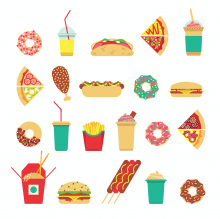6 Legitimate Reasons You Crave Junk Food

…and “lack of willpower’” isn’t one of them.
When you cave into a food craving – maybe it’s a bowl of ice cream or a giant cookie or a bag of cheesy puffs – how often do you wallow in shame and self-recrimination afterward?
If you’re like most people, the answer is 100 percent of the time.
As individuals and as a culture, we’ve been told that caving into nutritionally bankrupt food is about lack of willpower and personal weakness. Sometimes people even talk about overeating – and struggles with weight – as a moral failing. At the very least, our culture suggests, overeating junk food shows a deep lack of self-respect.
NONE of this is true.
So often, in fact, the urge to eat specific foods goes waaaaay beyond conscious control.
I get so upset when willpower or weakness get brought into the discussion. When we realize what we’re up against as healthy eaters, we begin to understand how deeply misguided (and shaming) that thinking is.
Here are some of the real drivers of food cravings, many of which can be successfully tackled with nutrition and lifestyle modifications.
1. Gut bacteria
Recent research suggests that the bacteria in the gut (which vastly outnumbers all the other cells in the body) influences our food cravings, driving us to eat foods that help them thrive. But what’s good for our bacteria isn’t always good for our health.
“Bacteria within the gut are manipulative,” said Carlo Maley, PhD, director of the UCSF Center for Evolution and Cancer. “There is a diversity of interests represented in the microbiome, some aligned with our own dietary goals, and others not.”
So if you have an overabundance of gut bacteria that need sugar to survive, they will release “signaling molecules into our gut,” note the researchers. “Because the gut is linked to the immune system, the endocrine system, and the nervous system, those signals could influence our physiologic and behavioral responses.” In other words, it may be your bacteria that has you reaching for another cookie, not your lack of willpower.
The good news is that the gut environment is very dynamic, changing minute-by-minute and meal-by-meal. With the right food and lifestyle choices, you can influence your microbiome balance within the day and help right those madcap cravings.
2. Yeast overgrowth
Eating too much sugar can lead to an overgrowth of yeast in the gut – and once there’s an overabundance of yeast in the gut, it triggers sugar cravings. A serious Catch-22.
Doing a gentle yeast cleanse can help – dramatically.
3. The blood sugar roller coaster
When you eat a high-sugar or simple-carbohydrate food, your blood sugar will spike and then crash – hard. And the body understands low blood sugar as a medical emergency– “Alert! Alert! There are too few calories in the system! Eat something NOW before you DIE!!” When your body gets to this place, it hijacks your brain and tells you to eat literally ANYTHING that is in front of you.
4. Institutional barriers
…and what’s often in front of you is junk, which is NOT your fault. Present-day food policies have made processed, high-sugar-and-unhealthy-fat foods waaaaay cheaper and more ubiquitous than organic, sustainable, good-for-you whole foods. It can be virtually impossible to find a healthy snack on the run in the middle of a busy day. And we’re all busy.
One of my favorite sayings is “Proper prior planning prevents poor performance,” and it applies here. By eating the right foods early in the day, and carrying some healthy snacks with you, you can avoid this pitfall.
5. Vitamin and mineral deficiencies
“Mineral and vitamin deficiencies lead the body to crave foods that provide a burst of energy, or a reliable hit of missing nutrients,” writes Alexandra Jamieson, author of Women, Food, and Desire.
Checking your vitamin and mineral levels and eating and supplementing accordingly can help ease deficiency-driven cravings.
6. Emotions
Did you find comfort in homemade chocolate chip cookies as a kid? You probably still do now. Comfort foods are called comfort foods for a reason. They soothe us when we are stressed (especially high-carb, high sugar foods, which help drive down the stress hormone cortisol) and they connect to past experiences of feeling comforted and safe.
These moments acquire awareness, mindfulness, and sometimes distraction. If asking yourself, “What do I really need in this moment?” or “What type of comfort am I seeking? Is there any other way I can feel safe?” isn’t working, try turning your attention elsewhere: get out in the yard and garden, go to the discount movie theater and watch the new summer blockbuster, bring the dogs to the dog park or the kids to the kiddie pool in the nearby park.
Add comment